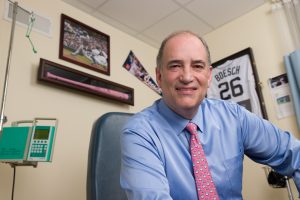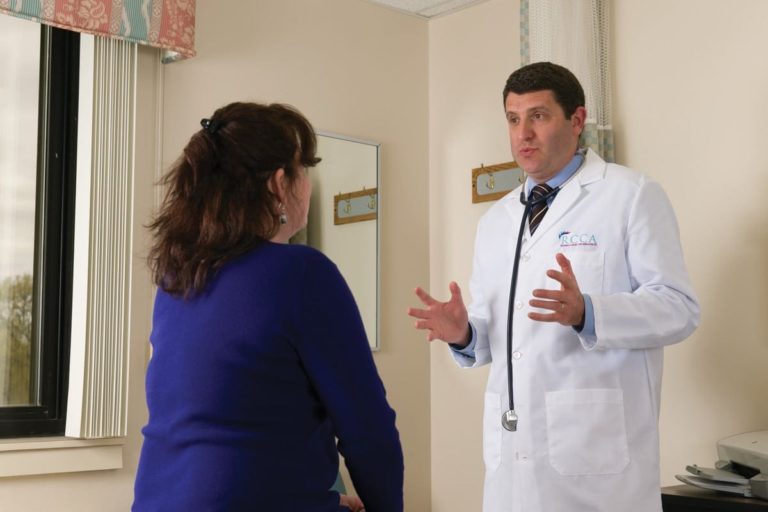
Cape Cod Oncologist Victor Aviles, MD: Offering Hope to Cancer Patients, Ballplayers, and Many More
Dr. Victor Aviles, a compassionate Cape Cod oncologist bringing hope and advanced cancer care to the community.
HIPAA Alert: Potential Data Breach Learn More
Questions on Oncology, Hematology and/or Infusion Clinical Services due to COVID-19 Crisis – CALL 833-698-1623
Important Information for Our Patients Regarding the Coronavirus.
RCCA Providing Area Cancer Patients with Access to Care During Coronavirus Outbreak
RCCA Offering Patients Virtual Visits During Coronavirus Pandemic
The need for viable and effective cancer treatment options has spurred the research and development of multiple strategies for helping patients achieve favorable outcomes and potential remission. The most common types of treatments that medical oncology offers are surgery, chemotherapy, radiation therapy, targeted therapy, and immunotherapy. An oncologist will make a treatment recommendation depending on the type of cancer a patient has and its stage.

A surgical operation can be used to diagnose, stage, prevent, and treat cancer. During a diagnosis, the doctor often carries out a biopsy to know what type of cancer the patient has and how far it has advanced. Surgery is most commonly used when cancer has not spread throughout the body. In this case, the surgeon has a higher success rate of removing or eliminating cancer. Working with the best oncologic team can assist in managing the condition well.
This treatment involves the use of drugs to treat cancer throughout the body. Chemo is prescribed for nearly all cancers—from solid tumors to hematologic malignancies. The doctor is responsible for determining what drugs or drug combinations to use. Factors to consider when choosing drugs include the type and stage of cancer, patient’s age and overall health, and any prior cancer treatments.
Also known as radiotherapy, radiation therapy involves the use of high-energy particles to destroy or damage cancer cells. It can be used to slow cancer growth, cure it, or stop it from returning. There are two options for radiation—external beam radiation therapy and internal radiation therapy. It may take days or weeks to see the effects of radiation therapy. It can be recommended for different types of cancer such as breast cancer and prostate cancer. Consult the best oncologist to see if this type of treatment is right for you.
Medical oncology researchers are continuing to find new changes in cancer cells that help them create more effective therapies for patients. In this treatment option, an oncologist targets specific vulnerabilities of cancer cells. First oncologists need to determine specific profiles of the cancer/tumor and whether there is a targeted agent that will work. Most therapies are either monoclonal antibodies, drugs that attach to the outer surface of the cells, or small-molecule drugs that can penetrate cells easily.
This type of cancer treatment supports the immune system to fight cancer. It works by marking cancer cells so that the immune system can find and destroy them. There are different types of immunotherapy including monoclonal antibodies, adoptive cell transfer, cytokines, treatment vaccines, and BCG treatment. Medical oncology professionals are still studying more options in clinical trials.
Medical Oncology Researchers have continually worked to develop more cancer treatments to reduce mortality rates, curb symptoms, and even cure cancer. Patients are always advised to work with the best oncologist to ensure the right treatment results, but it is important to note that all cases are different.
For more information or to schedule an appointment,
call 844-346-7222. You can also schedule an appointment by calling the RCCA location nearest you.

Dr. Victor Aviles, a compassionate Cape Cod oncologist bringing hope and advanced cancer care to the community.

The 20th Annual Hope Music Fest, presented by the Hope Community Cancer Center division of Regional Cancer Care Associates (RCCA), returns for a night filled

Black Americans with lung cancer are 18% less likely than white people to be diagnosed in the early stages of the disease, 23% less likely to receive surgery, and 21% less likely to survive 5 years after diagnosis, according to the American Lung Association.

Regional Cancer Care Associates is one of fewer than 200 medical practices in the country selected to participate in the Oncology Care Model (OCM); a recent Medicare initiative aimed at improving care coordination and access to and quality of care for Medicare beneficiaries undergoing chemotherapy treatment.